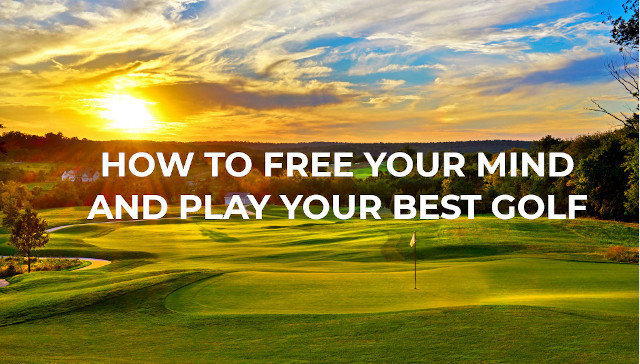
“The ego doesn’t exist in the present moment: To the ego, the present moment hardly exists. Only past and future are considered important.” – Eckhart Tolle
Being “in the present” is so important in golf. It frees your mind from negative thinking and your ego, allowing you to just be and get access to your best skills. The challenge we have today, is that nobody is ever truly present – we are constantly distracted (mostly by our mobile devices), and this doesn’t help us on the golf course. We’re losing the ability to be present, and we are at the mercy of every thought that pops into our heads.
The ancient practice of meditation and mindfulness is all about improving a person’s ability to access the present moment and increasing awareness of what they are focusing on and how they feel. With this practice you develop more self-control, and more control over your “performance state”, instead of allowing your thinking to dictate it.
I advise all my students to start a daily practice of meditation and mindfulness, as it has so many benefits (beyond golf).
Samurai Warriors adopted Zen Buddhism and meditation because it allowed them to fight with an “empty mind”. For these swordsman, having an empty mind was vital in the midst of combat as it freed them from doubt, fear and focus on technique. Of course they trained technique, but when combat began, all thinking departed and the purity of the action took over. This is how we need to be on the course – less thinking and more playing.
Be “Mindful” Of Your Thoughts and Emotions
The time in between shots is a good time to be aware of how you are thinking and feeling. One of the many benefits of the game of golf is that it gives us the opportunity to work on our mental skills that go beyond the game. Use your rounds to practice being present and mindful.
Thoughts => Emotions => Feelings => Behaviors/Actions
Emotions, feelings and behaviors start with thinking, so use the time in between shots to be aware of it. Whatever you are thinking it’s not “right or wrong”, they are just thoughts. Judging your thinking as “wrong” is reacting to it and will create frustration and tension. Being mindful is about being curious, non-judgmental and letting unhelpful thoughts pass so you can bring your attention back to the present (your anchor).
Direct your focus of attention to your breathing and your senses (i.e. the trees, sky, surrounding landscape, the wind, the ground beneath your feet, etc.). This will bring you to the present where you are, not “thinking”. When you are present, there is less emotion: Fear is always ‘future’. Excitement suggests thinking about results, regret suggests past mistakes. Instead, just keep playing the shot in hand until they run out.
Being in the present, is when your attention (focus) isn’t on what’s happened or what will happen (consequences), only on what’s happening now, e.g. your pre-shot routine or your walk in between shots (the stages of your performance process).
With practice, your inner voice can be listened to impartially, without judgement and reaction – you just gently bring your attention back to what’s happening now. One day you’ll catch yourself smiling at this inner voice!
Here’s an exercise for you…
Ask yourself: “I wonder what my next thought will be?” and ‘notice’ how long it is before a thought comes in. Keep practicing until you can extend that time to several seconds or more.
If it’s easier, focus on something, a glass, a golf ball, your breath etc. (be very specific e.g. the light sparkling off one dimple of the golf ball). Now hold your attention and see how long it is before a thought comes in, then notice if your mind drifts, and if it does, gently bring it back. Practice daily at first, then often to maintain the skill. This is essentially what meditation is – noticing where your mind is, catching yourself when you are no longer in the present and bringing your attention back your anchor i.e. your breathing. Every time you can do it, you increase your attention span and your awareness.
If you’re truly present you won’t be evaluating how you’re playing, keeping a running total, or be thinking ‘if only’. Instead, you’ll be present to each moment and getting the absolute best out of yourself no matter what game you have that day. I’m not saying this is an easy task, but it gets easier with every round. Learning how to meditate and be more mindful is covered in more detail in my Ultimate Mental Game Training System.
Thanks for reading. I hope this lesson will increase your awareness of what you are choosing to focus on during your rounds and allow you to let those unhelpful thoughts pass, so you have all the mental energy you need for what’s most important for playing your best.


